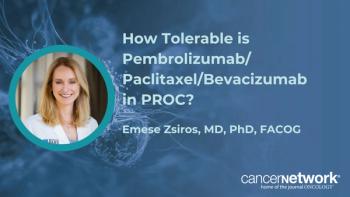
Trabectedin Plus PLD Shows Benefit in Real-Life Ovarian Cancer Setting
Trabectedin plus pegylated liposomal doxorubicin offered clinical benefit in a real-life setting of patients with previously treated platinum-sensitive recurrent ovarian cancer.
The combination of trabectedin and pegylated liposomal doxorubicin (PLD) offered clinical benefit and was reasonably well tolerated in a real-life setting of patients with previously treated platinum-sensitive recurrent ovarian cancer, according to a new study.
“Thus far no prospective, non-interventional study with trabectedin plus PLD had been performed in a routine clinical setting, with a more diverse patient population with platinum-sensitive recurrent ovarian cancer than that recruited in clinical trials,” wrote study authors led by Ingo B. Runnebaum, MD, of Jena University Hospital in Germany. “Such an observational study can provide useful insights of the real-world toxicity, efficacy, and management of patients receiving trabectedin plus PLD.”
The OVA-YOND trial included 77 patients with platinum-sensitive recurrent ovarian cancer who had been previously treated with at least one platinum-containing regimen. Patients received a median of 6 cycles of trabectedin plus PLD; 50.6% received 6 or more cycles. The median treatment duration was 4.2 months, and 88.3% of patients were treated on an outpatient basis. The results of the analysis were
Five patients (6.5%) achieved a complete response to the treatment, and another 19 patients (24.7%) achieved a partial response, for an overall response rate of 31.2% and a median duration of response of 6.25 months. Another 16 patients had disease stabilization, for a disease control rate of 52.0%.
The median progression-free survival was 6.3 months, and 77.2% of patients were free from progression at 3 months; at 6 months, that rate was 50.3%. The median time to progression was 7.3 months. The median overall survival was 16.4 months, and 58.3% of patients were alive 12 months after treatment.
Just over half of the cohort (57.1%) had at least one trabectedin-related adverse event (AE) of any grade. The most common grade 3/4 AEs included leukopenia (18.2% of patients), neutropenia (15.6%), and thrombocytopenia (9.1%).
With regard to PLD-related AEs, 63.6% of the study population experienced at least one AE of any grade. The most common grade 3/4 AEs related to PLD again included neutropenia (18.2%), leukopenia (15.6%), and thrombocytopenia (10.4%). There were no deaths attributed to drug-related AEs.
“The findings of this non-interventional, prospective real-life study consistently support that trabectedin plus PLD confers clinically meaningful long-term benefits to pretreated patients with platinum-sensitive recurrent ovarian cancer,” the authors concluded. “Large randomized trials are warranted to show that platinum-free combinations in platinum-sensitive disease may effectively allow patients’ recovery from previous platinum-associated adverse effects with similar or improved oncological outcome.”
Newsletter
Stay up to date on recent advances in the multidisciplinary approach to cancer.














































